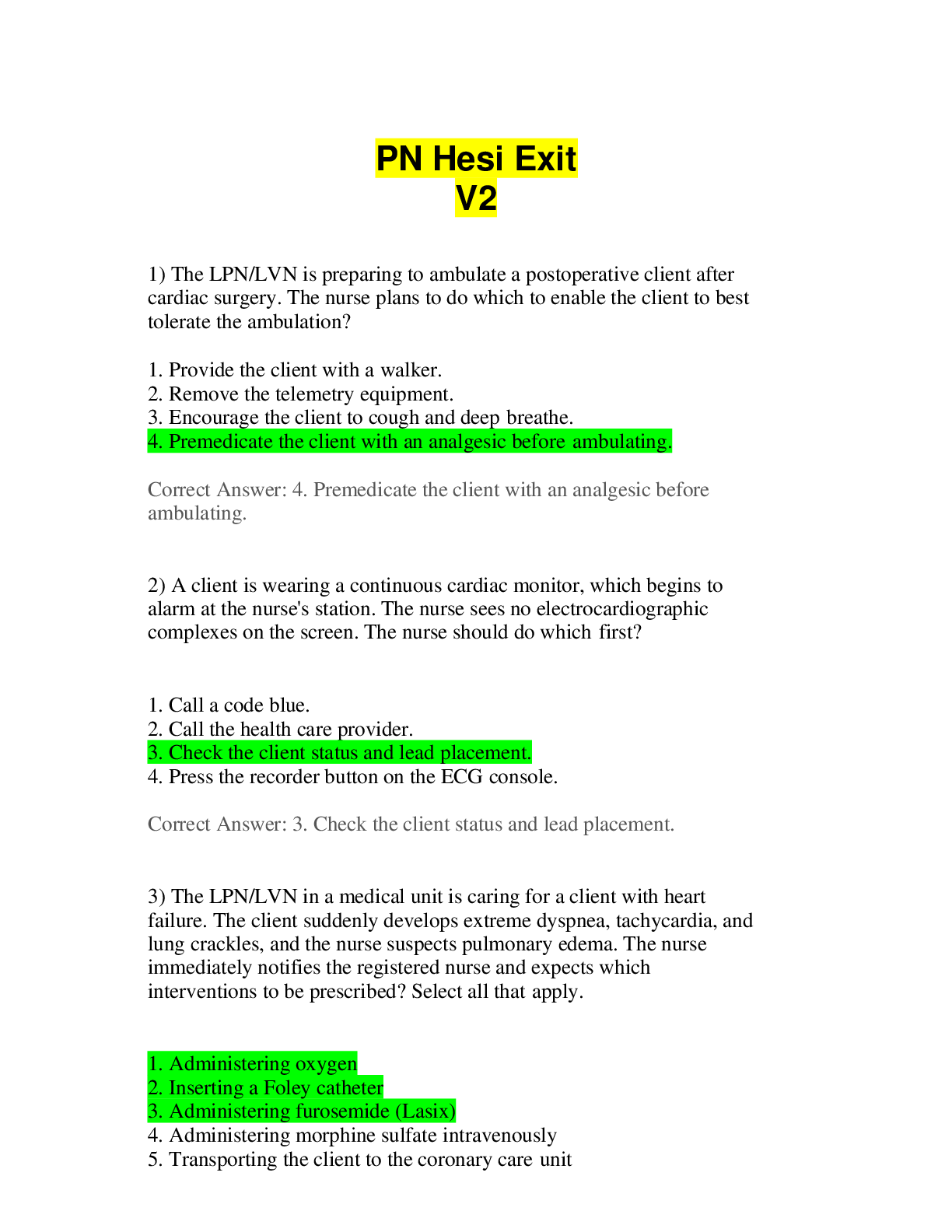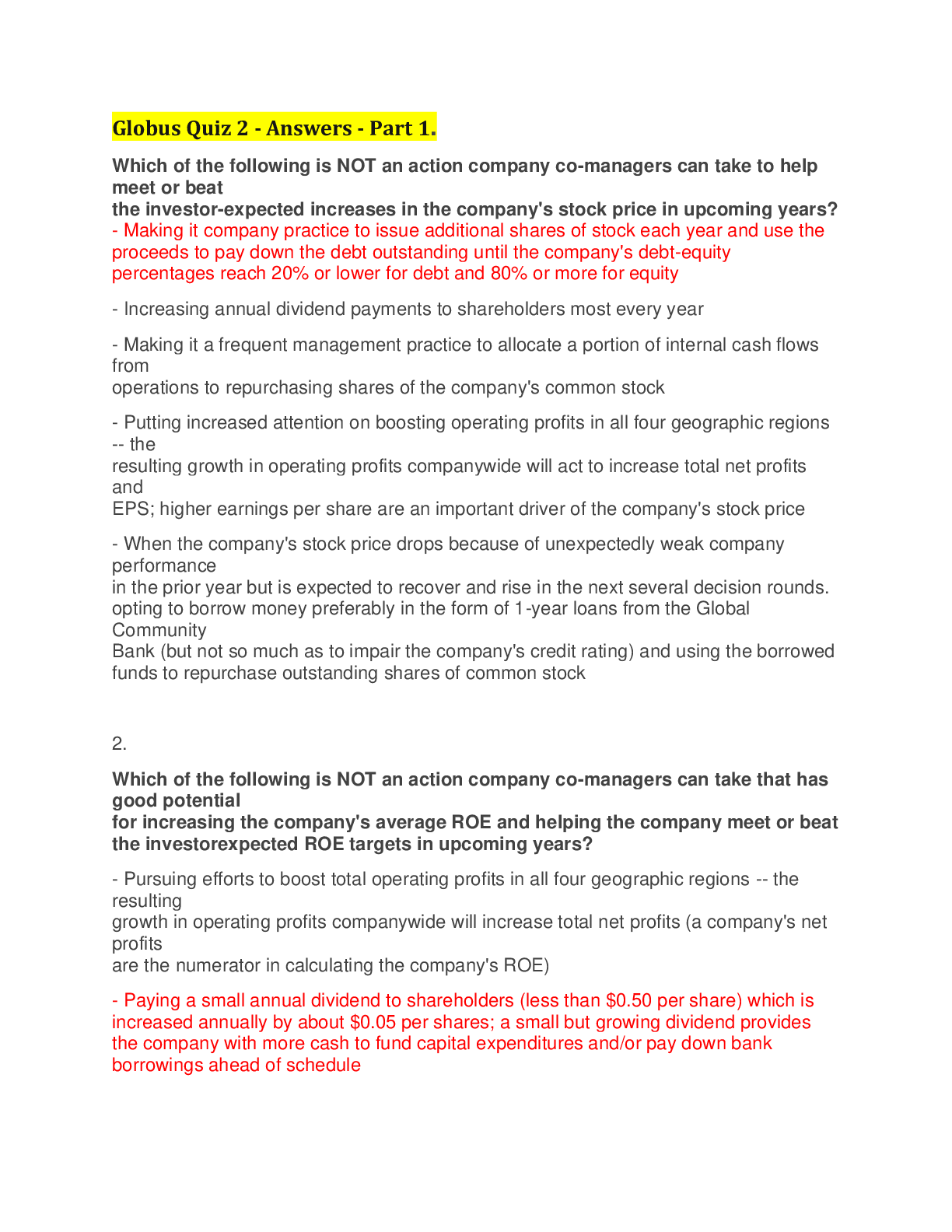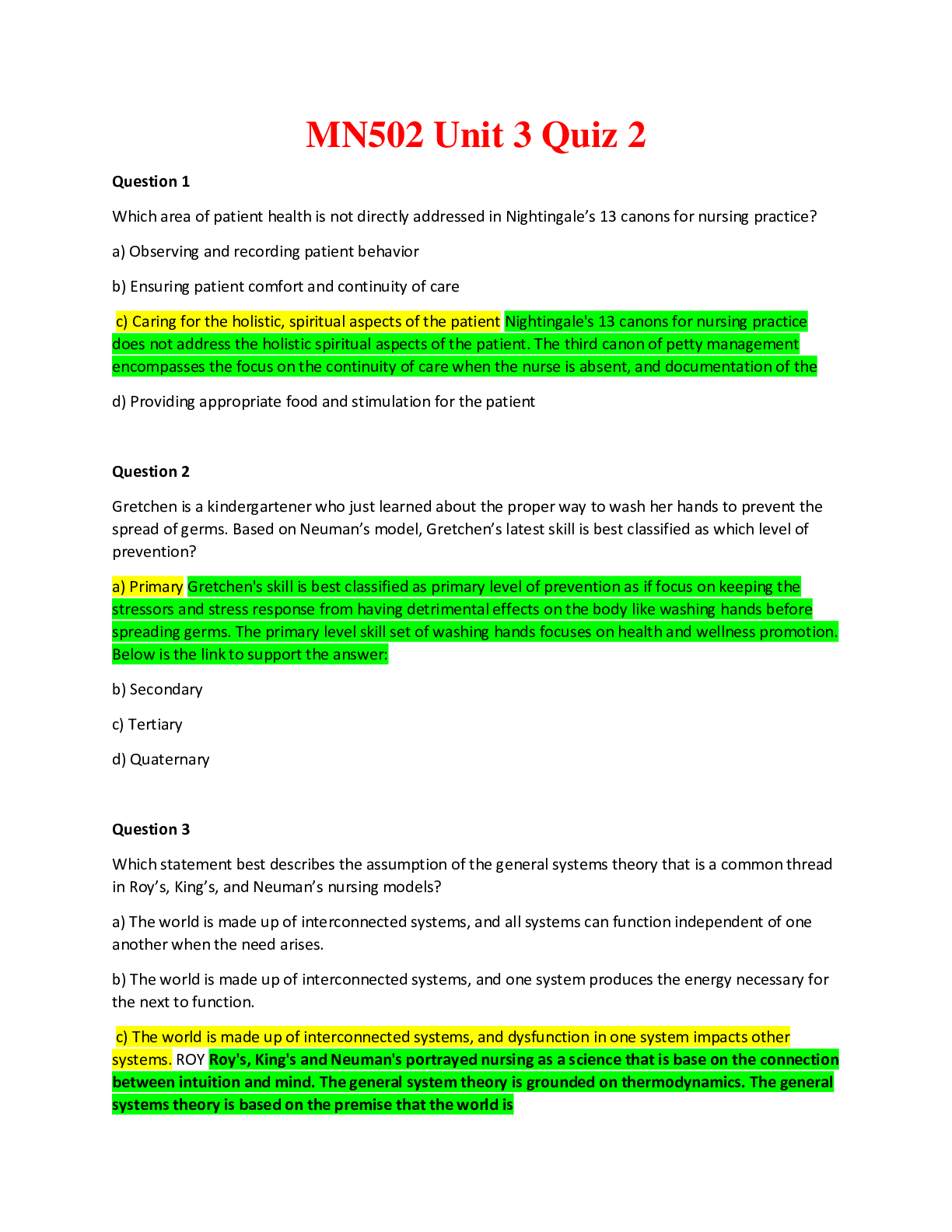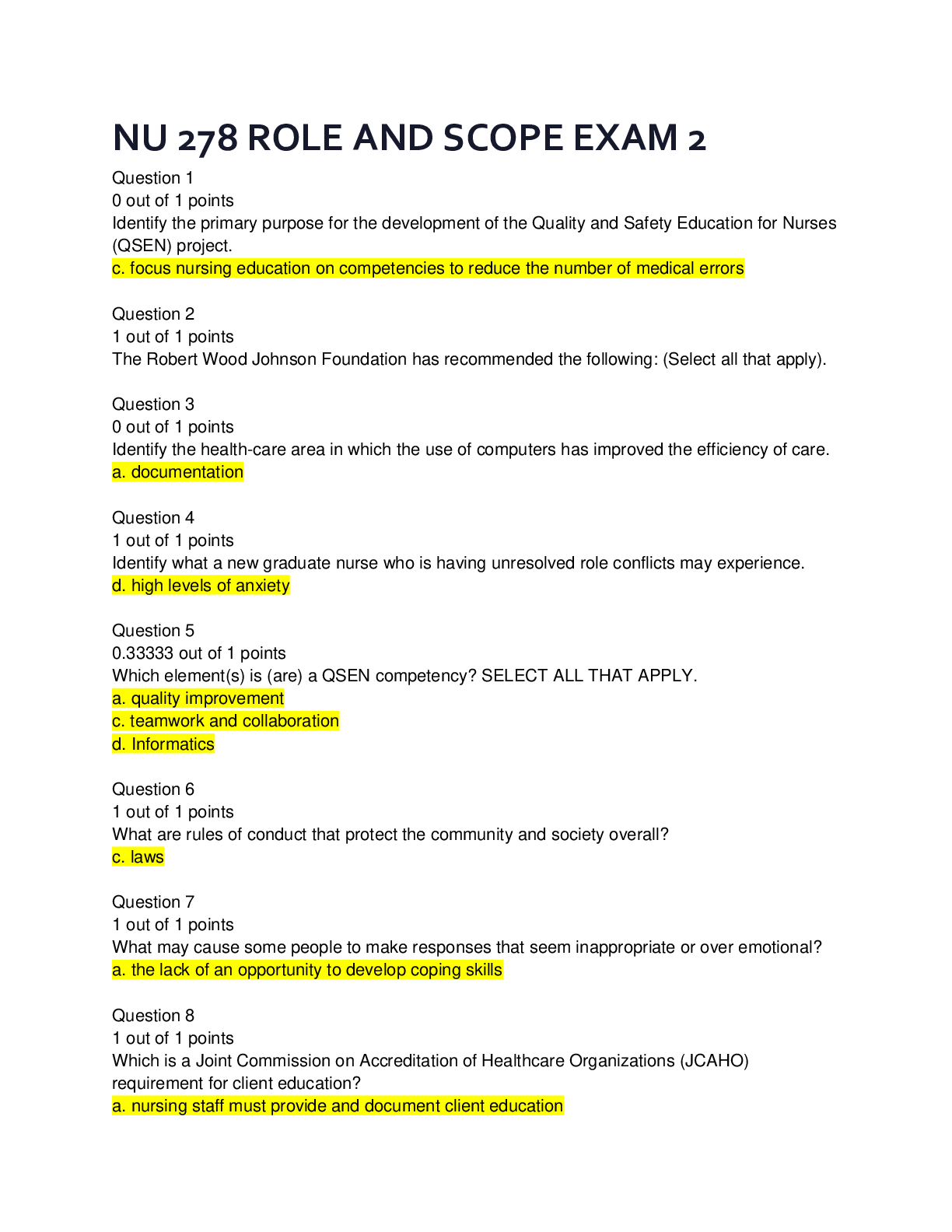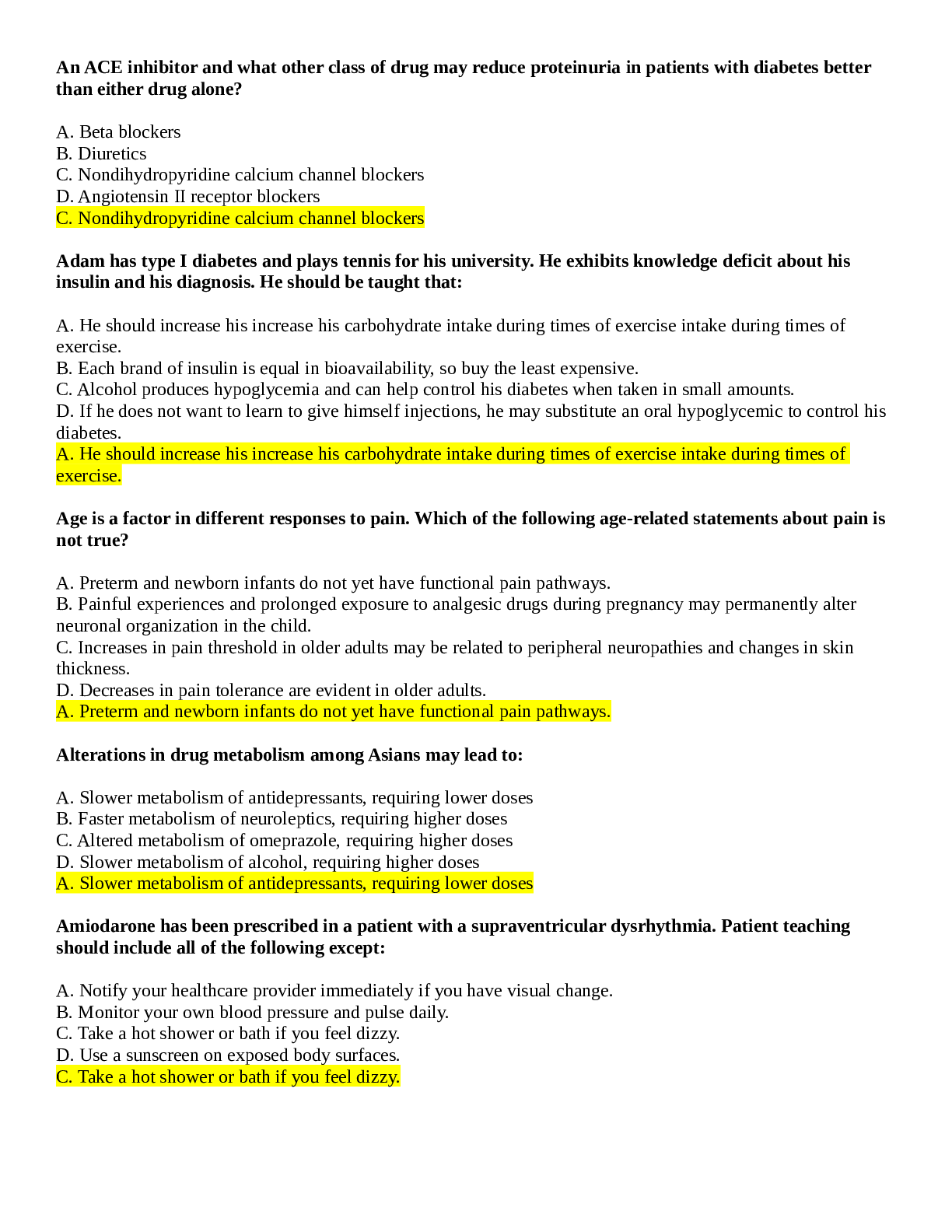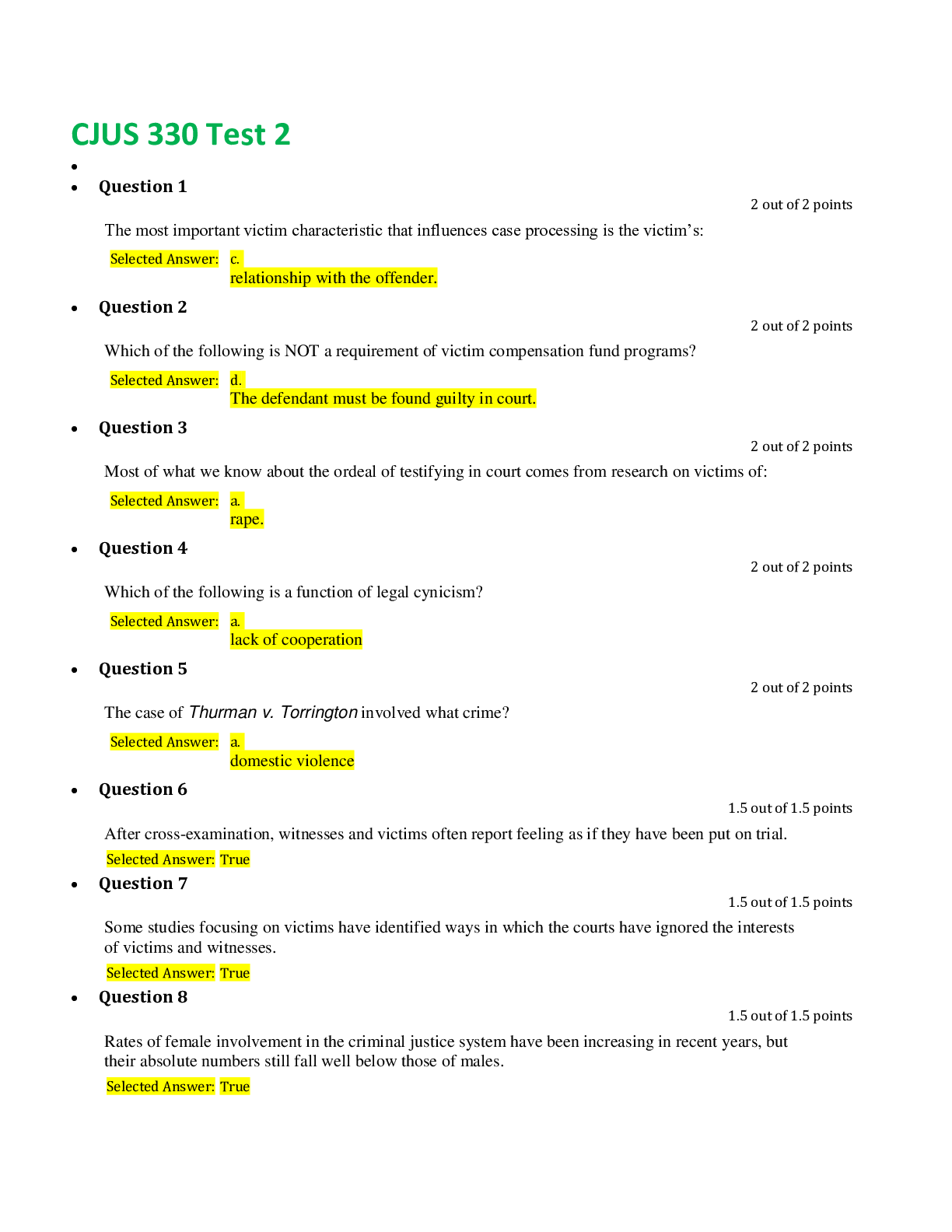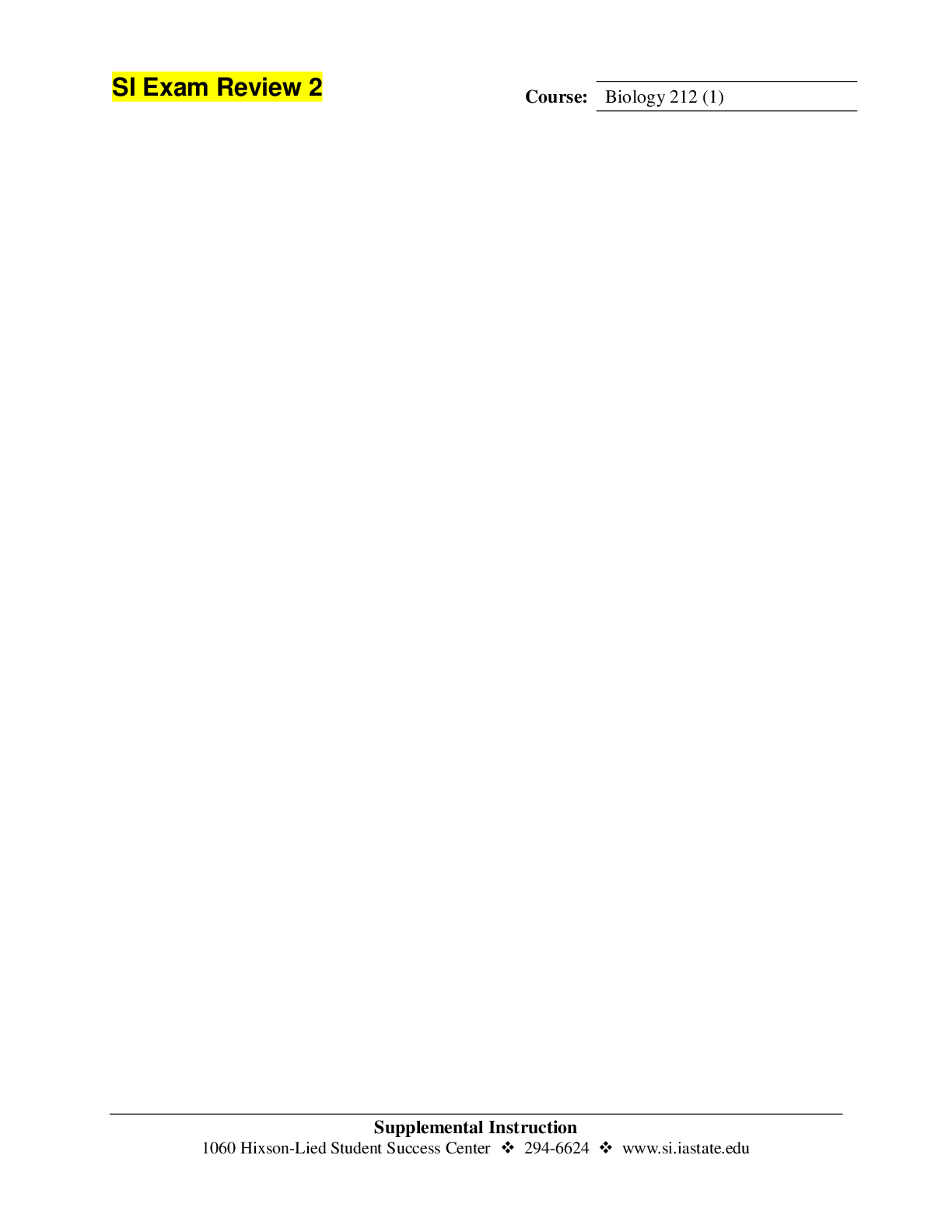*NURSING > EXAM > NURSING 1950 Mental Health Module 2 Questions and Answers SolutionOCR 100% Verified Guaranteed Pass (All)
NURSING 1950 Mental Health Module 2 Questions and Answers SolutionOCR 100% Verified Guaranteed Pass
Document Content and Description Below
NURSING 1950 Mental Health Module 2 Questions and Answers Solution A patient asks, "What are neurotransmitters? My doctor said mine are imbalanced." Select the nurse's best response. "Neurotrans... mitters are natural chemicals that pass messages between brain cells." The patient asked for information, and the correct response is most accurate. Neurotransmitters are chemical substances that function as messengers in the central nervous system. They are released from the axon terminal, diffuse across the synapse, and attach to specialized receptors on the postsynaptic neuron. 1. The parent of an adolescent diagnosed with schizophrenia asks the nurse, "My child's doctor ordered a PET. What kind of test is that?" Select the nurse's best reply. "PET means positron-emission tomography. It is a special type of scan that shows blood flow and activity in the brain." The parent is seeking information about PET scans. It is important to use terms the parent can understand, so the nurse should identify what the initials mean. 2. A patient with a long history of hypertension and diabetes now develops confusion. The health care provider wants to make a differential diagnosis between Alzheimer's disease and multiple infarcts. Which diagnostic procedure should the nurse expect to prepare the patient for first? CT scan A CT scan shows the presence or absence of structural changes, including cortical atrophy, ventricular enlargement, and areas of infarct, information that would be helpful to the health care provider. 3. A patient's history shows drinking 4 to 6 L of fluid and eating more than 6,000 calories per day. Which part of the central nervous system is most likely dysfunctional for this patient? Hypothalamus The hypothalamus, a small area in the ventral superior portion of the brainstem, plays a vital role in such basic drives as hunger, thirst, and sex. 4. The nurse prepares to assess a patient diagnosed with major depressive disorder for disturbances in circadian rhythms. Which question should the nurse ask this patient? "What are your worst and best times of the day?" Mood changes throughout the day may be related to circadian rhythm disturbances. Questions about sleep pattern are also relevant to circadian rhythms. 5. The nurse administers a medication that potentiates the action of ã-aminobutyric acid (GABA). Which effect would be expected? Reduced anxiety Increased levels of GABA reduce anxiety. Acetylcholine and substance P are associated with memory enhancement. Thought disorganization is associated with dopamine. GABA is not associated with sensory perceptual alterations. 6. A nurse would anticipate that treatment for a patient with memory difficulties might include medications designed to prevent destruction of acetylcholine Increased acetylcholine plays a role in learning and memory. Preventing destruction of acetylcholine by acetylcholinesterase would result in higher levels of acetylcholine, with the potential for improved memory. 7. A patient has disorganized thinking associated with schizophrenia. Neuroimaging would likely show dysfunction in which part of the brain? Frontal lobe The frontal lobe is responsible for intellectual functioning. 8. The nurse should assess a patient taking a drug with anticholinergic properties for inhibited function of the parasympathetic nervous system Acetylcholine is the neurotransmitter found in high concentration in the parasympathetic nervous system. When anticholinergic drugs inhibit acetylcholine action, blurred vision, dry mouth, constipation, and urinary retention commonly occur. 9. The therapeutic action of neurotransmitter inhibitors that block reuptake cause increased concentration of the blocked neurotransmitter in the synaptic gap If the reuptake of a substance is inhibited, it accumulates in the synaptic gap, and its concentration increases, permitting ease of transmission of impulses across the synaptic gap. Normal transmission of impulses across synaptic gaps is consistent with normal rather than depressed mood. 10. A patient taking medication for mental illness develops restlessness and an uncontrollable need to be in motion. Which drug action causes these symptoms to develop? Dopamine-blocking effects Medication that blocks dopamine often produces disturbances of movement, such as akathisia, because dopamine affects neurons involved in both thought processes and movement regulation. Anticholinergic effects include dry mouth, blurred vision, urinary retention, and constipation. 11. A fearful patient has an increased heart rate and blood pressure. The nurse suspects increased activity of which neurotransmitter? Norepinephrine Norepinephrine is the neurotransmitter associated with sympathetic nervous system stimulation, preparing the individual for "fight or flight.” 12. A patient has acute anxiety related to an automobile accident 2 hours ago. The nurse should teach the patient about medication from which group? Benzodiazepines Benzodiazepines provide anxiety relief. 13. A patient is hospitalized for severe major depressive disorder. Of the medications listed below, the nurse can expect to provide the patient with teaching about sertraline Sertraline (Zoloft) is a selective serotonin reuptake inhibitor (SSRI). This antidepressant blocks the reuptake of serotonin, with few anticholinergic and sedating side effects. 14. A patient diagnosed with bipolar disorder displays aggressiveness, agitation, talkativeness, and irritability. The nurse expects the health care provider to prescribe a medication from which group? Mood stabilizers The symptoms describe mania, which is effectively treated by mood stabilizers, such as lithium, and selected anticonvulsants (carbamazepine, valproic acid, and lamotrigine). 15. A drug causes muscarinic receptor blockade. The nurse will assess the patient for dry mouth Muscarinic receptor blockade includes atropine-like side effects, such as dry mouth, blurred vision, and constipation. 16. A patient begins therapy with a phenothiazine medication. What teaching should the nurse provide related to the drug's strong dopaminergic effect? Report changes in muscle movement Phenothiazines block dopamine receptors in both the limbic system and basal ganglia. Movement disorders and motor abnormalities (extrapyramidal side effects), such as parkinsonism, akinesia, akathisia, dyskinesia, and tardive dyskinesia, are likely to occur early in the course of treatment. They are often heralded by sensations of muscle stiffness. Early intervention with antiparkinsonian medication can increase the patient's comfort and prevent dystonic reactions. 17. A patient tells the nurse, "My doctor prescribed paroxetine for my depression. I assume I'll have side effects like I had when I was taking imipramine." The nurse's reply should be based on the knowledge that paroxetine is a(n) SSRI Paroxetine is an SSRI and will not produce the same side effects as imipramine, a tricyclic antidepressant. 18. A nurse can anticipate anticholinergic side effects are likely when a patient takes imipramine Imipramine (Tofranil) is a tricyclic antidepressant with strong anticholinergic properties, resulting in dry mouth, blurred vision, constipation, and urinary retention. 19. Which instruction has priority when teaching a patient about clozapine? "Report sore throat and fever immediately." Clozapine therapy may produce agranulocytosis; therefore, signs of infection should be immediately reported to the health care provider. In addition, the patient should have white blood cell levels measured weekly. 20. A nurse cares for a group of patients receiving various medications, including haloperidol, carbamazepine, trazodone, and phenalgine. The nurse will order a special diet for the patient who takes phenelzine Patients taking phenelzine, a MAO inhibitor, must be on a low tyramine diet to prevent hypertensive crisis. 21. A nurse instructs a patient taking a drug that inhibits MAO to avoid certain foods and drugs because of the risk of hypertensive crisis Patients taking MAO-inhibiting drugs must be on a low tyramine diet to prevent hypertensive crisis. In the presence of MAO inhibitors, tyramine is not destroyed by the liver and in high levels produces intense vasoconstriction, resulting in elevated blood pressure. 22. A nurse caring for a patient taking a SSRI will develop outcome criteria related to improvement in depression SSRIs affect mood, relieving depression in many cases. SSRIs do not act to reduce thought disorders. SSRIs reduce depression but have little effect on motor hyperactivity. SSRIs do not produce extrapyramidal symptoms. 23. By which mechanism do SSRI medications improve depression? Making more serotonin available at the synaptic gap Depression is thought to be related to lowered availability of the neurotransmitter serotonin. SSRIs act by blocking reuptake of serotonin, leaving a higher concentration available at the synaptic cleft. SSRIs prevent destruction of serotonin. 24. The laboratory report for a patient taking clozapine (Clozaril) shows a white blood cell count of 3000 mm3. Select the nurse's best action. Report the results to the health care provider immediately These laboratory values indicate the possibility of agranulocytosis, a serious side effect of clozapine therapy. These results must be immediately reported to the health care provider, and the drug should be withheld. The health care provider may repeat the test, but in the meantime, the drug should be withheld. 25. A drug blocks the attachment of norepinephrine to α1 receptors. The patient may experience orthostatic hypotension Sympathetic-mediated vasoconstriction is essential for maintaining normal blood pressure in the upright position. Blockage of α1 receptors leads to vasodilation and orthostatic hypotension. Orthostatic hypotension may cause fainting and falls. Teach patients ways of minimizing this phenomenon. 26. A nurse cares for four patients who are receiving clozapine, lithium, fluoxetine, and venlafaxine, respectively. With which patient should the nurse be most alert for problems associated with fluid and electrolyte imbalance? The patient receiving lithium Lithium is a salt and known to alter fluid and electrolyte balance, producing polyuria, edema, and other symptoms of imbalance. 27. An obese patient has a diagnosis of schizophrenia. Medications that block which receptors would contribute to further weight gain? H1 H1 receptor blockade results in weight gain, which is undesirable for an obese patient. Blocking of the other receptors would have little or no effect on the patient's weight. 28. An individual hiking in the forest encounters a large poisonous snake on the path. Which change in this individual's vital signs is most likely? Blood pressure changes from 114/62 to 136/78 This frightening experience would stimulate the sympathetic nervous system, causing a release of norepinephrine, an excitatory neurotransmitter. It prepares the body for fight or flight. Increased blood pressure, pupil size, respiratory rate, and pulse rate signify release of norepinephrine. Intestinal cramping would be associated with stimulation of the parasympathetic nervous system. 29. Consider these medications: carbamazepine, lamotrigine, gabapentin. Which medication below also belongs to this group? Valproate The medications listed in the stem are mood stabilizers, anticonvulsant types. Valproate (Depakote) is also a member of this group. 30. A professional football player is seen in the emergency department after losing consciousness from an illegal block. Prior to discharge, the nurse assists the patient to schedule an outpatient computed tomography (CT) scan for the next day. Which strategy should the nurse use to ensure the patient remembers the appointment? Log the appointment day, time, and location into the player's cell phone calendar feature This player may have suffered repeated head injuries with damage to the hippocampus. The hippocampus has significant role in maintaining memory. Logging the appointment into the player's cell phone calendar will remind him of the appointment the next day. Paper will be lost, and the patient is unlikely to remember verbal instruction. 31. A nurse prepares to administer a second-generation antipsychotic medication to a patient diagnosed with schizophrenia. Additional monitoring for adverse effects will be most important if the patient has which co-morbid health problems? (Select all that apply.) Parkinson's disease Hyperlipidemia Diabetes Antipsychotic medications may produce weight gain, which would complicate care of a patient with diabetes, and increase serum triglycerides, which would complicate care of a patient with hyperlipidemia. Parkinson's disease involves changes in transmission of dopamine and acetylcholine, so these drugs would also complicate care of this patient. 32. Questions the nurse could ask that would be nonjudgmental when obtaining information about a patient's use of complementary and herbal remedies include (Select all that apply) "What herbal medicines have you used to relieve your symptoms?" "What over-the-counter medicines, vitamins, and nutritional supplements do you use?" "What differences in your symptoms do you notice when you take herbal supplements?" "Have you experienced problems from using herbal and prescription drugs at the same time?" The correct responses are neutral in tone and do not express bias for or against the use of complementary or herbal medicines. 33. An individual is experiencing problems with memory. Which of these structures are most likely to be involved in this deficit? (Select all that apply.) Amygdala Hippocampus Temporal lobe The frontal and temporal lobes of the cerebrum play a key role in the storage and processing of memories. The amygdala and hippocampus also play roles in memory. The occipital lobe is predominantly involved with vision. The basal ganglia influence integration of physical movement, as well as some thoughts and emotions. 34. A patient's sibling says, "My brother has a mental illness, but the doctor ordered a functional magnetic resonance image (fMRI) test. That test is too expensive and will just increase the hospital bill." Select the nurse's best responses. (Select all that apply.) "Sometimes there are physical causes for psychiatric symptoms. This test will help us understand whether that is the situation." "Some mental illnesses are evident on fMRIs. This test will give information to help us plan the best care for your brother." The correct responses provide information to the sibling. Modern imaging techniques are important tools in assessing molecular changes in mental disease and marking the receptor sites of drug action, which can help in treatment planning. Psychiatric symptoms can be caused by anatomical or physiologic abnormalities. 35. A nurse assesses a confused older adult. The nurse experiences sadness and reflects, "The patient is like one of my grandparents...so helpless." Which response is the nurse demonstrating? Countertransference Countertransference is the nurse's transference or response to a patient that is based on the nurse's unconscious needs, conflicts, problems, or view of the world. See relationship to audience response question. 36. Which statement shows a nurse has empathy for a patient who made a suicide attempt? "You must have been very upset when you tried to hurt yourself." Empathy permits the nurse to see an event from the patient's perspective, understand the patient's feelings, and communicate this to the patient. 37. After several therapeutic encounters with a patient who recently attempted suicide, which occurrence should cause the nurse to consider the possibility of countertransference? The nurse feels unusually happy when the patient's mood begins to lift. Strong positive or negative reactions toward a patient or over-identification with the patient indicate possible countertransference. Nurses must carefully monitor their own feelings and reactions to detect countertransference and then seek supervision. Realistic and appropriate reactions from a patient toward a nurse are desirable. 38. A patient says, "Please don't share information about me with the other people." How should the nurse respond? "I will not share information with your family or friends without your permission, but I share information about you with other staff." A patient has the right to know with whom the nurse will share information and that confidentiality will be protected. Although the relationship is primarily between the nurse and patient, other staff needs to know pertinent data. 39. A nurse is talking with a patient, and 5 minutes remain in the session. The patient has been silent most of the session. Another patient comes to the door of the room, interrupts, and says to the nurse, "I really need to talk to you." The nurse should: Tell the interrupting patient, "This session is 5 more minutes; then I will talk with you." When a specific duration for sessions has been set, the nurse must adhere to the schedule. Leaving the first patient would be equivalent to abandonment and would destroy any trust the patient had in the nurse. Adhering to the contract demonstrates that the nurse can be trusted and that the patient and the sessions are important. 40. Termination of a therapeutic nurse-patient relationship has been successful when the nurse: Discusses with the patient changes that happened during the relationship and evaluates outcomes. Summarizing and evaluating progress help validate the experience for the patient and the nurse and facilitate closure. Termination must be discussed; avoiding discussion by spending little time with the patient promotes feelings of abandonment. 41. What is the desirable outcome for the orientation stage of a nurse-patient relationship? The patient will demonstrate behaviors that indicate: rapport and trust with the nurse Development of rapport and trust is necessary before the relationship can progress to the working phase. 42. During which phase of the nurse-patient relationship can the nurse anticipate that identified patient issues will be explored and resolved? Working During the working phase, the nurse strives to assist the patient in making connections among dysfunctional behaviors, thinking, and emotions and offers support while alternative coping behaviors are tried. 43. At what point in the nurse-patient relationship should a nurse plan to first address termination? During the orientation phase The patient has a right to know the conditions of the nurse-patient relationship. If the relationship is to be time-limited, the patient should be informed of the number of sessions. If it is open-ended, the termination date will not be known at the outset, and the patient should know that the issue will be negotiated at a later date. The nurse is responsible for bringing up the topic of termination early in the relationship, usually during the orientation phase. 44. A nurse introduces the matter of a contract during the first session with a new patient because contracts: spell out the participation and responsibilities of each party A contract emphasizes that the nurse works with the patient rather than doing something for the patient. "Working with" is a process that suggests each party is expected to participate and share responsibility for outcomes. 45. As a nurse escorts a patient being discharged after treatment for major depression, the patient gives the nurse a necklace with a heart pendant and says, "Thank you for helping mend my broken heart." Which is the nurse's best response? "I'm glad I could help you, but I can't accept the gift. My reward is seeing you with a renewed sense of hope." Accepting a gift creates a social rather than therapeutic relationship with the patient and blurs the boundaries of the relationship. A caring nurse will acknowledge the patient's gesture of appreciation, but the gift should not be accepted. 46. Which remark by a patient indicates passage from orientation to the working phase of a nurse- patient relationship? "I want to find a way to deal with my anger without becoming violent." Thinking about a more constructive approach to dealing with anger indicates a readiness to make a behavioral change. Behavioral change is associated with the working phase of the relationship. 47. A nurse explains to the family of a mentally ill patient how a nurse-patient relationship differs from social relationships. Which is the best explanation? "The focus is on the patient. Problems are discussed by the nurse and patient, but solutions are implemented by the patient." This response describes elements of a therapeutic relationship. 48. A nurse wants to demonstrate genuineness with a patient diagnosed with schizophrenia. The nurse should: use congruent communication strategies. Genuineness is a desirable characteristic involving awareness of one's own feelings as they arise and the ability to communicate them when appropriate. 49. A nurse caring for a withdrawn, suspicious patient recognizes development of feelings of anger toward the patient. The nurse should: discuss the anger with a clinician during a supervisory session The nurse is accountable for the relationship. Objectivity is threatened by strong positive or negative feelings toward a patient. Supervision is necessary to work through countertransference feelings. 50. A nurse wants to enhance growth of a patient by showing positive regard. The nurse's action most likely to achieve this goal is: staying with a tearful patient Staying with a crying patient offers support and shows positive regard 51. A patient says, "I've done a lot of cheating and manipulating in my relationships." Select a nonjudgmental response by the nurse. "How do you feel about that?" Asking a patient to reflect on feelings about his or her actions does not imply any judgment about those actions, and it encourages the patient to explore feelings and values. 52. A patient says, "People should be allowed to commit suicide without interference from others." A nurse replies, "You're wrong. Nothing is bad enough to justify death." What is the best analysis of this interchange? Differing values are reflected in the two statements Values guide beliefs and actions. The individuals stating their positions place different values on life and autonomy. Nurses must be aware of their own values and be sensitive to the values of others. 53. Which issues should a nurse address during the first interview with a patient with a psychiatric disorder? Relationship parameters, the contract, confidentiality, and termination Relationship parameters, the contract, confidentiality, and termination are issues that should be considered during the orientation phase of the relationship. The remaining options are issues that are dealt with later. 54. An advanced practice nurse observes a novice nurse expressing irritability regarding a patient with a long history of alcoholism and suspects the new nurse is experiencing countertransference. Which comment by the new nurse confirms this suspicion? "My parents were alcoholics and often neglected our family." Countertransference occurs when the nurse unconsciously and inappropriately displaces onto the patient feelings and behaviors related to significant figures in the nurse's past. In this instance, the new nurse's irritability stems from relationships with parents. 55. Which behavior shows that a nurse values autonomy? The nurse: discusses options and helps the patient weigh the consequences A high level of valuing is acting on one's belief. Autonomy is supported when the nurse helps a patient weigh alternatives and their consequences before the patient makes a decision. Autonomy or self- determination is not the issue in any of the other behaviors. 56. As a nurse discharges a patient, the patient gives the nurse a card of appreciation made in an arts and crafts group. What is the nurse's best action? Recognize the effectiveness of the relationship and patient's thoughtfulness. Accept the card. The nurse must consider the meaning, timing, and value of the gift. In this instance, the nurse should accept the patient's expression of gratitude. 57. A patient says, "I'm still on restriction, but I want to attend some off-unit activities. Would you ask the doctor to change my privileges?" What is the nurse's best response? "That's a good topic for you to discuss with your doctor." Nurses should encourage patients to work at their optimal level of functioning. A nurse does not act for the patient unless it is necessary. Acting for a patient increases feelings of helplessness and dependency 58. A community mental health nurse has worked with a patient for 3 years but is moving out of the city and terminates the relationship. When a novice nurse begins work with this patient, what is the starting point for the relationship? Begin at the orientation phase After termination of a long-term relationship, the patient and new nurse usually have to begin at ground zero, the orientation phase, to build a new relationship. If termination is successfully completed, the orientation phase sometimes progresses quickly to the working phase. Other times, even after successful termination, the orientation phase may be prolonged. 59. As a patient diagnosed with a mental illness is being discharged from a facility, a nurse invites the patient to the annual staff picnic. What is the best analysis of this scenario? The nurse's action blurs the boundaries of the therapeutic relationship. The invitation creates a social relationship rather than a therapeutic relationship. 60. A nurse says, "I am the only one who truly understands this patient. Other staff members are too critical." The nurse's statement indicates: boundary blurring When the role of the nurse and the role of the patient shift, boundary blurring may arise. In this situation the nurse is becoming over-involved with the patient as a probable result of unrecognized countertransference. When boundary issues occur, the need for supervision exists. 61. Which descriptors exemplify consistency regarding nurse-patient relationships? Select all that apply. -Having the same nurse care for a patient on a daily basis -Providing a schedule of daily activities to a patient -Setting a time for regular sessions with a patient Consistency implies predictability. Having the same nurse see the patient daily and provide a daily schedule of patient activities and a set time for regular sessions will help a patient predict what will happen during each day and develop a greater degree of security and comfort. 62. A nurse ends a relationship with a patient. Which actions by the nurse should be included in the termination phase? Select all that apply. -Focus dialogues with the patient on problems that may occur in the future. -Help the patient express feelings about the relationship with the nurse. 63. A novice psychiatric nurse has a parent with bipolar disorder. This nurse angrily recalls feelings of embarrassment about the parent's behavior in the community. Select the best ways for this nurse to cope with these feelings. Select all that apply. -Seek ways to use the understanding gained from childhood to help patients cope with their own illnesses. -Recognize that the feelings may add sensitivity to the nurse's practice, but supervision is important. The nurse needs support to explore these feelings. An experienced psychiatric nurse is a resource that may be helpful. The knowledge and experience gained from the nurse's relationship with a mentally ill parent may contribute sensitivity to compassionate practice. 64. A novice nurse tells a mentor, "I want to convey to my patients that I am interested in them and that I want to listen to what they have to say." Which behaviors will be helpful in meeting the nurse's goal? Select all that apply. -Introducing self to a patient and identifying own role -Using facial expressions to convey interest and encouragement -Assuming an open body posture and sometimes mirror imaging Trust is fostered when the nurse gives an introduction and identifies his or her role. Facial expressions that convey interest and encouragement support the nurse's verbal statements to that effect and strengthen the message. An open body posture conveys openness to listening to what the patient has to say. Mirror imaging enhances patient comfort. 65. A patient says to the nurse, "I dreamed I was stoned. When I woke up, I felt emotionally drained, as though I hadn't rested well." Which response should the nurse use to clarify the patient's comment? "Can you give me an example of what you mean by 'stoned'?" The technique of clarification is therapeutic and helps the nurse examine the meaning of the patient's statement. Asking for a definition of "stoned" directly asks for clarification. 66. A patient diagnosed with schizophrenia tells the nurse, "The CIA is monitoring us through the fluorescent lights in this room. Be careful what you say." Which response by the nurse would be most therapeutic? "It sounds like you're concerned about your privacy." It is important not to challenge the patient's beliefs, even if they are unrealistic. Challenging undermines the patient's trust in the nurse. The nurse should try to understand the underlying feelings or thoughts the patient's message conveys. The correct response uses the therapeutic technique of reflection. 67. The patient says, "My marriage is just great. My spouse and I always agree." The nurse observes the patient's foot moving continuously as the patient twirls a shirt button. The conclusion the nurse can draw is that the patient's communication is: mixed Mixed messages involve the transmission of conflicting or incongruent messages by the speaker. The patient's verbal message that all was well in the relationship was modified by the nonverbal behaviors denoting anxiety. 68. A nurse interacts with a newly hospitalized patient. Select the nurse's comment that applies the communication technique of "offering self." "I'd like to sit with you for a while to help you get comfortable talking to me." "Offering self" is a technique that should be used in the orientation phase of the nurse-patient relationship. Sitting with the patient, an example of "offering self," helps to build trust and convey that the nurse cares about the patient. 69. Which technique will best communicate to a patient that the nurse is interested in listening? Restating a feeling or thought the patient has expressed Restating allows the patient to validate the nurse's understanding of what has been communicated. Restating is an active listening technique. 70. A patient discloses several concerns and associated feelings. If the nurse wants to seek clarification, which comment would be appropriate? "Am I correct in understanding that . . ." Asking, "Am I correct in understanding that..." permits clarification to ensure that both the nurse and patient share mutual understanding of the communication. 71. A patient tells the nurse, "I don't think I'll ever get out of here." Select the nurse's most therapeutic response. "You don't think you're making progress?" By asking if the patient does not believe that progress has been made, the nurse is reflecting by putting into words what the patient is hinting. By making communication more explicit, issues are easier to identify and resolve. 72. Documentation in a patient's chart shows, "Throughout a 5-minute interaction, patient fidgeted and tapped left foot, periodically covered face with hands, and looked under chair while stating, 'I enjoy spending time with you.'" Which analysis is most accurate? The patient's verbal and nonverbal messages are incongruent When a verbal message is not reinforced with nonverbal behavior, the message is confusing and incongruent. Some clinicians call it a "mixed message." 73. While talking with a patient diagnosed with major depression, a nurse notices the patient is unable to maintain eye contact. The patient's chin lowers to the chest, while the patient looks at the floor. Which aspect of communication has the nurse assessed? Nonverbal communication Eye contact and body movements are considered nonverbal communication. 74. During the first interview with a parent whose child died in a car accident, the nurse feels empathic and reaches out to take the patient's hand. Select the correct analysis of the nurse's behavior. The gesture is premature. The patient's cultural and individual interpretation of touch is unknown Touch has various cultural and individual interpretations. Nurses should refrain from using touch until an assessment can be made regarding the way in which the patient will perceive touch. 75. During a one-on-one interaction with the nurse, a patient frequently looks nervously at the door. Select the best comment by the nurse regarding this nonverbal communication. "I notice you keep looking toward the door." Making observations and encouraging the patient to describe perceptions are useful therapeutic communication techniques for this situation. 76. A black patient says to a white nurse, "There's no sense talking. You wouldn't understand because you live in a white world." The nurse's best action would be to: say, "Please give an example of something you think I wouldn't understand." Having the patient speak in specifics rather than globally will help the nurse understand the patient's perspective. This approach will help the nurse engage the patient. 77. A Filipino American patient had a nursing diagnosis of situational low self-esteem related to poor social skills as evidenced by lack of eye contact. Interventions were used to raise the patient's self- esteem, but after 3 weeks, the patient's eye contact did not improve. What is the most accurate analysis of this scenario? The nurse should have assessed the patient's culture before making this diagnosis and plan. The amount of eye contact a person engages in is often culturally determined. In some cultures, eye contact is considered insolent, whereas in others eye contact is expected. Asian Americans, including persons from the Philippines, often prefer not to engage in direct eye contact. 78. When a female Mexican American patient and a female nurse sit together, the patient often holds the nurse's hand. The patient also links arms with the nurse when they walk. The nurse is uncomfortable with this behavior. Which analysis is most accurate? The patient is accustomed to touch during conversation, as are members of many Hispanic subcultures. The most likely answer is that the patient's behavior is culturally influenced. Hispanic women frequently touch women they consider to be their friends. 79. A Puerto Rican American patient uses dramatic body language when describing emotional discomfort. Which analysis most likely explains the patient's behavior? The patient: belongs to a culture in which dramatic body language is the norm Members of Hispanic American subcultures tend to use high affect and dramatic body language as they communicate. 80. During an interview, a patient attempts to shift the focus from self to the nurse by asking personal questions. The nurse should respond by saying: "The time we spend together is to discuss your concerns." When a patient tries to focus on the nurse, the nurse should refocus the discussion back onto the patient. Telling the patient that interview time should be used to discuss patient concerns refocuses discussion in a neutral way. 81. Which principle should guide the nurse in determining the extent of silence to use during patient interview sessions? Silence can provide meaningful moments for reflection. Silence can be helpful to both participants by giving each an opportunity to contemplate what has transpired, weigh alternatives, and formulate ideas. 82. A patient is having difficulty making a decision. The nurse has mixed feelings about whether to provide advice. Which principle usually applies? Giving advice: is rarely helpful Giving advice fosters dependence on the nurse and interferes with the patient's right to make personal decisions. It robs patients of the opportunity to weigh alternatives and develop problem-solving skills. Furthermore, it contributes to patient feelings of personal inadequacy. It also keeps the nurse in control and feeling powerful. 83. A school age child tells the school nurse, "Other kids call me mean names and will not sit with me at lunch. Nobody likes me." Select the nurse's most therapeutic response. "Tell me more about how you feel." The correct response uses exploring, a therapeutic technique. 84. A patient with acute depression states, "God is punishing me for my past sins." What is the nurse's most therapeutic response? "You sound very upset about this." The nurse reflects the patient's comment, a therapeutic technique to encourage sharing for perceptions and feelings. 85. A patient cries as the nurse explores the patient's feelings about the death of a close friend. The patient sobs, "I shouldn't be crying like this. It happened a long time ago." Which responses by the nurse facilitate communication? Select all that apply. -"I can see that you feel sad about this situation." -"The loss of a close friend is very painful for you." -"Crying is a way of expressing the hurt you are experiencing." Reflecting ("I can see that you feel sad," "This is very painful for you") and giving information ("Crying is a way of expressing hurt") are therapeutic techniques. 86. Which benefits are most associated with use of telehealth technologies? Select all that apply. -Cost savings for patients -Maximize care management -Access to services for patients in rural areas Telehealth has shown it can maximize health and improve disease management skills and confidence with the disease process. Many rural parents have felt disconnected from services; telehealth technologies can solve those problems. 87. Which comments by a nurse demonstrate use of therapeutic communication techniques? Select all that apply. - "I'm glad you were able to tell me how you felt about your loss." - "I noticed your hands trembling when you told me about your accident." The correct responses demonstrate use of the therapeutic techniques making an observation and showing empathy. 88. A nurse is interacting with patients in a psychiatric unit. Which statements reflect use of therapeutic communication? Select all that apply. - "Tell me more about that situation." - "I notice you are pacing a lot." - "I'll stay with you a while." The correct responses demonstrate use of the therapeutic techniques making an observation and showing empathy. 89. An adult patient admitted with anxiety states, "My counselor keeps talking about my stressors. What exactly are stressors?" How does the nurse best respond to the patient? "Stressors are events that threaten your current functioning and require you to adapt." 90. Self-help groups are useful for reducing stress because they provide the individual with the stress mediator identified as Social support Self-help groups often provide a high level of social support. Members meet and are encouraged and sustained by others who share the same problem. 91. The first stage of the general adaptation syndrome can be characterized as Adaptive The initial adaptive response of the general adaptation syndrome prepares the individual to fight or flee in the face of acute stress. 92. Stress can be attributed to stimulation of the hypothalamus-pituitary-adrenal cortex, and over the long term it can result in Insulin resistance Insulin resistance and obesity are considered long-term sequelae of the high blood glucose levels incurred when the body responds to stress. 93. A patient is extremely depressed after ending a relationship with a partner. The nurse is teaching cognitive reframing techniques to this patient as a means to counteract depression. Which response given by the patient indicates effective teaching by the nurse? "I have many friends who love and care for me." The nurse should teach cognitive reframing to patients who are depressed and suffer from self-blame. It helps the patients develop positive insight towards life and real-life situations. In this regard, the patient's response, "I have many friends who love and care for me," is appropriate because it is a positive statement. 94. A Hispanic woman has been in an abusive relationship for 3 years. Which comment by this patient is most likely? "I have very bad headaches that make it hard for me to care for my children." The patient is experiencing severe stress but expressing it somatically. The overwhelming majority of Asians, Africans, and Central Americans tend to express distress in somatic terms and actually experience it physically. In the correct answer, the patient has expressed her distress about the abuse with complaints of headaches. 95. A nurse teaches a patient a technique for examining negative thoughts and restating them in positive ways. This technique is called Cognitive reframing Cognitive reframing calls for changing the viewpoint of a situation and replacing it with another viewpoint that fits the facts but is less negative 96. Which interventions will the nurse include in the plan of care of a patient diagnosed with generalized anxiety syndrome (GAS) resulting from stress? Select all that apply. -Going to sleep 30 minutes earlier than usual. -Listening to soothing music to increase relaxation. -Including 30 minutes of exercise into your daily routine three days a week. 97. What should the nurse do for a patient who is experiencing the alarm stage of stress? Assess for a dry mouth 98. An effective stress-reduction technique a nurse might teach an individual with performance anxiety is Deep breathing 99. The nurse teaches a patient with anxiety about stress and triggers. Which statement made by the patient indicates the teaching was effective? "People can have good and bad stress." 100. Which assessment question focuses on determining the resilience of a preteen child? Select all that apply. -"How do you and your friends have fun?" -"How are you adjusting to your new school?" -"What would you do if you forgot your homework?" -"What job would you like when you grow up?" 101. A patient diagnosed with hypertension uses an automatic cycling blood pressure cuff with audible changing tones. The patient uses relaxation techniques to lower blood pressure and is informed of ongoing success by the tone. This process describes Biofeedback 102. The nurse is conducting group therapy for geriatric patients. The nurse gives instructions to the patients, "Close your eyes and imagine a peaceful scene, you are very comfortable, nothing is there to disturb you." What feedback given by the patients after the therapy indicates effective therapy? The patients Report relief from pain 103. Which physiologic responses are associated with severe long-term stress? Select all that apply. -Obesity -Atherosclerosis -Protein breakdown 104. What is the psychological state that results in anxiety, depression, confusion, helplessness, hopelessness, and fatigue? Distress Distress is the result of a negative perception toward a stressor such as a death in the family, financial overload, and school or work demands. 105. A patient scheduled for surgery seems to be anxious. The nurse teaches the patient to practice deep breathing exercises. What is the most appropriate reason for teaching deep breathing exercises to the patient? To dampen the cognitive process involved in anxiety reactions. 106. A nurse advises a stressed patient to perform meditation to decrease stress levels. How does meditation help in relieving stress? By creating a hypometabolic state of quieting the sympathetic nervous system. Meditation helps to elicit relaxation by creating a hypometabolic state of quieting the sympathetic nervous system. A decreased activation of the sympathetic nervous system reduces the stress responses and promotes relaxation. 107. During a home visit, the nurse finds that an adolescent is upset after failing a midterm exam at school. What positive statement does the nurse use to comfort the adolescent? "You can learn from this experience and refocus your attention to improve your future performance." 108. A woman anticipating her wedding ceremony in a week comes to the Urgent Care Clinic with a headache that has been ongoing for three days duration as well as a pounding feeling in her chest. She is concerned that she may be having a stroke or a cerebral vascular accident (CVA). All medical tests are negative. The woman wonders what is happening to her because she feels she is unable to function. What is the best response to her question? You are having difficulty coping with your upcoming wedding. 109. Over a 5-year period, an adult experienced liver failure. A liver transplant was performed. During the immediate postoperative period, which intervention could the nurse recommend to enhance healing and reduce the harmful effects of stress? Listening to music 110. Which approach to reducing patient stress is most effective in people with low to moderate hypnotic ability? Biofeedback 111. What is the term used to describe the psychological or physical stimuli that are incompatible with the current functioning of an individual and require adaptation in the human body? Stressors 112. The nurse is caring for a 35-year-old female patient who reports occasional panic attacks, fatigue, and amenorrhea. What can the nurse infer about this patient? The patient has chronic stress. 113. One effect of stress can be attributed to the stimulation of the hypothalamus-pituitary-adrenal cortex, causing a short-term increase in Gluconeogenesis 114. A diagnosis of chronic stress is supported by which assessment finding? Select all that apply. -Amenorrhea -History of panic attacks -Insulin-resistant diabetes 115. A patient tells members of a therapy group, "I hear voices saying my doctor is poisoning me." Another patient replies, "I used to hear voices too. They sounded real, but I found out later they were not. The voices you hear are not real either." Which therapeutic factor is exemplified in this interchange? Interpersonal learning Here a member gains insight into his own experiences from hearing about the experiences of others through interpersonal learning. 116. A leader plans to start a new self-esteem building group. Which intervention would be most helpful for assuring mutual respect within the group? Describe the importance of mutual respect in the first session and make it a group norm. It is helpful to motivate members to behave respectfully by describing how mutual respect benefits all members and is necessary for the group to be fully therapeutic. Setting a tone and expectation of mutual respect from the outset is the most helpful intervention listed. 117. A young female member in a therapy group says to an older female member, "You are just like my mother, always trying to control me with your observations and suggestions." Which therapeutic factor of a group is evident by this behavior? Corrective recapitulation of the primary family group The younger patient is demonstrating an emotional attachment to the older patient that mirrors patterns within her own family of origin, a phenomenon called corrective recapitulation of the primary family group. Feedback from the group then helps the member gain insight about this behavior and leads to more effective ways of relating to her family members. 118. During group therapy, one patient says to another, "When I first started in this group, you were unable to make a decision, but now you can. You've made a lot of progress. I am beginning to think that maybe I can conquer my fears too." Which therapeutic factor is evident by this statement? Hope The patient's profession that he may be able to learn to cope more effectively reflects hope. Groups can instill hope in individuals who are demoralized or pessimistic. 119. During a group therapy session, a newly admitted patient suddenly says to the nurse, "How old are you? You seem too young to be leading a group." Select the nurse's most appropriate response. "You are wondering whether I have enough experience to lead this group?" A question such as this is common in the initial phase of group development when members are getting to know one another, dealing with trust issues, and testing the leader. Making explicit the implied serves to role model more effective communication and prompts further discussion of the patient's concern. 120. A patient in a group therapy session listens to others and then remarks, "I used to think I was the only one who felt afraid. I guess I'm not as alone as I thought." This comment is an example of: universality Realizing that one is not alone and that others share the same problems and feelings is called universality. 121. A nurse at the well child clinic realizes that many parents have misconceptions about effective ways of disciplining their children. The nurse decides to form a group to address this problem. What should be the focus of the group? Health education The nurse has diagnosed a knowledge deficit. The focus of the group should be education. 122. Which outcome would be most appropriate for a symptom-management group for persons with schizophrenia? Group members will: describe ways to cope with their illness An appropriate psychoeducational focus for patients with schizophrenia is managing their symptoms; coping with symptoms such as impaired memory or impaired reality testing can improve functioning and enhance their quality of life. 123. A patient has talked constantly throughout the group therapy session, often repeating the same comments. Other members were initially attentive then became bored, inattentive, and finally sullen. Which comment by the nurse leader would be most effective? Say to everyone, "Most of you have become quiet. I wonder if it might be related to concerns you may have about how the group is progressing today." The most effective action the nurse leader can take will be the one that encourages the group to solve its own problem. Pointing out changes in the group and asking members to respond to them lays the foundation for a discussion of group dynamics. 124. Guidelines followed by the leader of a therapeutic group include focusing on recognizing dysfunctional behavior and thinking patterns, followed by identifying and practicing more adaptive alternate behaviors and thinking. Which theory is evident by this approach? Cognitive-behavioral The characteristics described are those of cognitive-behavioral therapy, in which patients learn to reframe dysfunctional thoughts and extinguish maladaptive behaviors. Behavioral therapy focuses solely on changing behavior rather than thoughts, feelings, and behaviors together. 125. The nurse is planning a new sexuality group for patients. Which location would best enhance the effectiveness of this group? A small conference room The conference room would provide a quiet, private area with few distractions, separate from other patient areas and effective for teaching and learning about a private topic. 126. Which remark by a group participant would the nurse expect during the working stage of group therapy? "I don't think I agree with your action. It might help you, but it seems like it would upset your family." In the working stage, members actively interact to help each other accomplish goals, and because trust has developed, conflict and disagreement can be expressed. 127. Three members of a therapy group share covert glances as other members of the group describe problems. When one makes a statement that subtly criticizes another speaker, the others nod in agreement. Which group dynamic should the leader suspect? Some members are acting as a subgroup instead of as members of the main group. Subgroups, small groups isolated within a larger group and functioning separately from it, sometimes form within therapy groups. When this occurs, subgroup members are cohesive with other subgroup members but not with the members of the larger group. Members of the subgroup may be bored or frustrated or expressing passive aggression, but the primary dynamic is the splitting off from the main group. 128. A therapy group adds new members as others leave. What type of group is evident? Open An open group is a group that adds members throughout the life of the group as other members leave and as more persons who would benefit from the group become available. 129. During a therapy group that uses existential/Gestalt theory, patients shared feelings that occurred at the time of their admission. After a brief silence, one member says, "Several people have described feeling angry. I would like to hear from members who had other feelings." Which group role is evident by this comment? Encourager The member is filling the role of encourager by acknowledging those who have contributed and encouraging input from others. 130. A group begins the working phase. One member has a childhood history of neglect and ridicule by parents. Which comment would the group leader expect from this member? "My boss is always expecting more of me than the others but talking to him would only make it worse." People who frequently complain, yet reject help or suggestions when offered, tend to have histories of severe deprivation as children, often accompanied by neglect or abuse. 131. A group is in the working phase. One member says, "That is the stupidest thing I've ever heard. Everyone whines and tells everyone else what to do. This group is a total waste of my time." Which comment by the group leader would be most therapeutic? "It must be hard to be so angry." Direct this comment to another group member, "You were also angry at first but not now. What has helped you?" The member's comments demean the group and its members and suggest that the member is very angry. Labeling the emotion and conveying empathy would be therapeutic. Focusing on members who are likely to be more positive can balance the influence of demoralizing members. 132. A group is in the working phase. One member states, "That is the stupidest thing I've ever heard. Everyone whines and tells everyone else what to do. This group is a waste of my time." Which initial action by the group leader would be most therapeutic? Meet privately with the member outside of group to discuss the anger. Meeting privately with the member can convey interest and help defuse the anger so that it is less disruptive to the group. 133. A group has two more sessions before it ends. One member was previously vocal and has shown much progress but has now grown silent. What explanation most likely underlies this behavior? The silent member: is having trouble dealing with feelings about termination of this group A chief task during the termination phase of a group is to take what has been learned in group and transition to life without the group. The end of a group can be a significant loss for members, who may experience loss and grief and respond with sadness or anger. It is unlikely he would have nothing to say; at the very least, he could be responding to the comments of others even if not focusing on his own issues. He may wish to give quieter members a chance to talk, but again, this would not require or explain his complete silence. Some members, faced with only two remaining sessions, may be becoming more dominant under this pressure of time, but here too this is unlikely to lead a previously active participant to fall completely silent. 134. A patient in a support group says, "I'm tired of being sick. Everyone always helps me, but I will be glad when I can help someone else." This statement reflects: altruism Altruism refers to the experience of being helpful or useful to others, a condition that the patient anticipates will happen. 135. During a support group, a patient diagnosed with schizophrenia says, "Sometimes I feel sad that I will never have a good job like my brother. Then I dwell on it and maybe I should not." Select the nurse leader's best comment to facilitate discussion of this issue. "How have others in the group handled painful feelings like these?" Asking others to share their experiences will facilitate discussion of an issue. Giving information may serve to close discussion of the issue because it sounds final. 136. A nurse leads a psychoeducational group for patients in the community diagnosed with schizophrenia. A realistic outcome for group members is that they will: discuss ways to manage their illness Patients with schizophrenia almost universally have problems associated with everyday living in the community, so discussing ways to manage the illness would be an important aspect of psychoeducation. Discussing concerns about daily life would be a goal to which each could relate. 137. A patient in a detoxification unit asks, "What good it will do to go to Alcoholics Anonymous and talk to other people with the same problem?" The nurse's best response would be to explain that self- help groups such as AA provide opportunities for: people with common problems to share their experiences with alcoholism and recovery The patient needs basic information about the purpose of a self-help group. The basis of self-help groups is sharing by individuals with similar problems. Self-help is based on the belief that an individual with a problem can be truly understood and helped only by others who have the same problem. 138. Which type of group is a staff nurse with 2 months' psychiatric experience best qualified to conduct? Medication education group All nurses receive information about patient teaching strategies and basic information about psychotropic medications, making a medication education group a logical group for a beginner to conduct. 139. The next-to-last meeting of an interpersonal therapy group is taking place. The leader should take which actions? Select all that apply. -Facilitate discussion and resolution of feelings about the end of the group -Encourage members to reflect on their progress and that of the group itself -Help members identify goals they would like to accomplish after the group ends The goals for the termination phase of groups are to prepare the group for separation, resolve related feelings, and prepare each member for the future. Contributions and accomplishments of members are elicited, post-group goals are identified, and feelings about the group's ending are discussed. Group norms are the focus of the orientation phase, and conflict and problem solving are emphasized in the working phase. 140. A leader begins the discussion at the first meeting of a new group. Which comments should be included? Select all that apply. -"When someone shares a personal experience, it's important to keep the information confidential." -"It is important for everyone to arrive on time for our group." The leader must set ground rules for the group before members can effectively participate. Confidentiality of personal experiences should be maintained. Arriving on time is important to the group process. 141. A married couple has two biologic children who live with them as well as a child from the wife's first marriage. What type of family is evident? Blended 142. A married couple has two children living in the home. Recently, the wife's mother moved in. This family should be assessed as: extended 143. When a nurse assesses a family, which family task has the highest priority for healthy family functioning? Physical maintenance and safety 144. Which documentation of family assessment indicates a healthy and functional family? Members provide mutual support 145. A 15-year-old is hospitalized after a suicide attempt. This adolescent lives with the mother, stepfather, and several siblings. When performing a family assessment, the nurse must first determine: names and relationships of the family's members 146. Which information is the nurse most likely to find when assessing the family of a patient with a serious mental illness? Stress from living with a mentally ill member has challenged the family's function 147. The parent of an adolescent diagnosed with mental illness asks the nurse, "Why do you want to do a family assessment? My teenager is the patient, not the rest of us." Select the nurse's best response. "Every family member's perception of events is different and adds to the total picture." 148. An adult diagnosed with schizophrenia lives with elderly parents. The patient was recently hospitalized with acute psychosis. One parent is very anxious, and the other is ill because of the stress. Which nursing diagnosis is most applicable to this scenario? Caregiver role strain related to the stress of chronic illness 149. An adult recently diagnosed with AIDS is hospitalized with pneumonia. The patient and family are very anxious. Select the best outcome to add to the plan of care for this family. Identify and describe effective methods for coping with anxiety 150. A parent is admitted to a chemical dependency treatment unit. The patient's spouse and adolescent children participate in a family session. What is the most important aspect of this family's assessment? Interactions among family members 151. A parent is admitted to a chemical dependency treatment unit. The patient's spouse and adolescent children attend a family session. Which initial assessment question should the nurse ask of family members? "How are feelings expressed in your family?" 152. A nurse interviews a homeless parent with two teenage children. To best assess the family's use of resources, the nurse should ask: "What community agencies have you found helpful in the past?" 153. Two divorced people plan to marry. The man has a teenager, and the woman has a toddler. This family will benefit most from: guidance about parenting children at two developmental levels 154. Parents of a teenager recently diagnosed with serious mental illness express dismay. One parent says, "Our hopes for our child's future are ruined. We probably won't ever have grandchildren." The nurse will use interventions to assist with: grieving 155. Parents of a teenager recently diagnosed with serious mental illness express dismay. One parent says, "Our child acts so strangely that we don't invite friends to our home. We quit taking vacations. Sometimes we don't get any sleep." Which nursing diagnosis best applies? Interrupted family processes 158. A family expresses helplessness related to dealing with a mentally ill member's odd behaviors, mood swings, and argumentativeness. An effective nursing intervention for this family would be to: role-play difficult situations 159. Parents of a mentally ill teenager say, "We have never known anyone who was mentally ill. We have no one to talk to because none of our friends understand the problems we are facing." Select the nurse's most helpful intervention. Refer the parents to a support group 160. Select the best question for the nurse to ask to assess a family's ability to cope. "Describe how you successfully handled one family problem." 161. Which scenario best illustrates scapegoating within a family? Family members project problems of the family onto one particular family member 162. A parent became unemployed 6 months ago. The parent has subsequently been verbally abusive toward the spouse and oldest child. The child ran away twice, and the spouse has become depressed. What is the most appropriate nursing diagnosis for this family? Disabled family coping related to insecurity secondary to loss of family income 163. A parent says, "My son and I argue constantly since he started using drugs. When I talk to him about not using drugs, he tells me to stay out of his business." What is the nurse's first most appropriate action? Make a referral for family therapy 164. Which scenario best demonstrates a healthy family? A couple renews their marital relationship after their children become adults 165. Which comment by a mother during a family therapy session shows evidence of scapegoating? "Our youngest child always starts arguments and upsets everyone else." 166. Which example of behavior in a family system demonstrates double-bind communication? A wife tells her husband, "You go ahead with your bowling trip. Try not to worry about me falling on my crutches while I'm alone at home." 167. A wife believes her husband is having an affair. Lately, he has been disinterested in romance and working late. The husband has an important, demanding project at work. The mother asks her teen, "What have you noticed about your father?" The teen later mentions this to the father, who says, "Tell your mother that I can't deal with her insecurities right now." Which family dynamic is evident? Triangulation 168. A 16-year-old wants to drive, but the parents will not allow it. A 14-year-old sibling was invited to several sleepovers, but the parents found reasons to deny permission. Both teens are annoyed because the parents buy clothes for them that are more suitable for younger children. The parents say, "We don't want our kids to grow up too fast." Which term best describes this family's boundaries? Rigid 169. A wife believes her husband is having an affair. Lately, he has been disinterested in romance and working late. The husband has an important, demanding project at work. The mother asks her teen, "What have you noticed about your father?" The teen later mentions this to the father, who says, "Tell your mother that I can't deal with her insecurities right now." Family therapy should focus on: (select all that apply) - identifying and reducing the cognitive distortion in each parent's perceptions - helping the parents find ways to cope more effectively with their stress and fears - supporting the teen to redirect the parents when they try to communicate through her -helping the husband understand how others might misinterpret the changes in his behavior 170. A parent was recently hospitalized with severe depression. Family members say, "We're falling apart. Nobody knows what to expect, who should make decisions, or how to keep the family together." Which interventions should the nurse use when working with this family? Select all that apply. - Help the family set realistic expectations - Provide empathy, acceptance, and support - Empower the family by teaching problem solving - Negotiate role flexibility amongst family members 171. Which situations are most likely to place severe, disabling stress on a family? Select all that apply. - A parent needs long-term care after sustaining a severe brain injury - A spouse is diagnosed with liver failure and needs a transplant - Parents of three children, aged 9, 7, and 2 years, get a divorce [Show More]
Last updated: 2 years ago
Preview 1 out of 31 pages
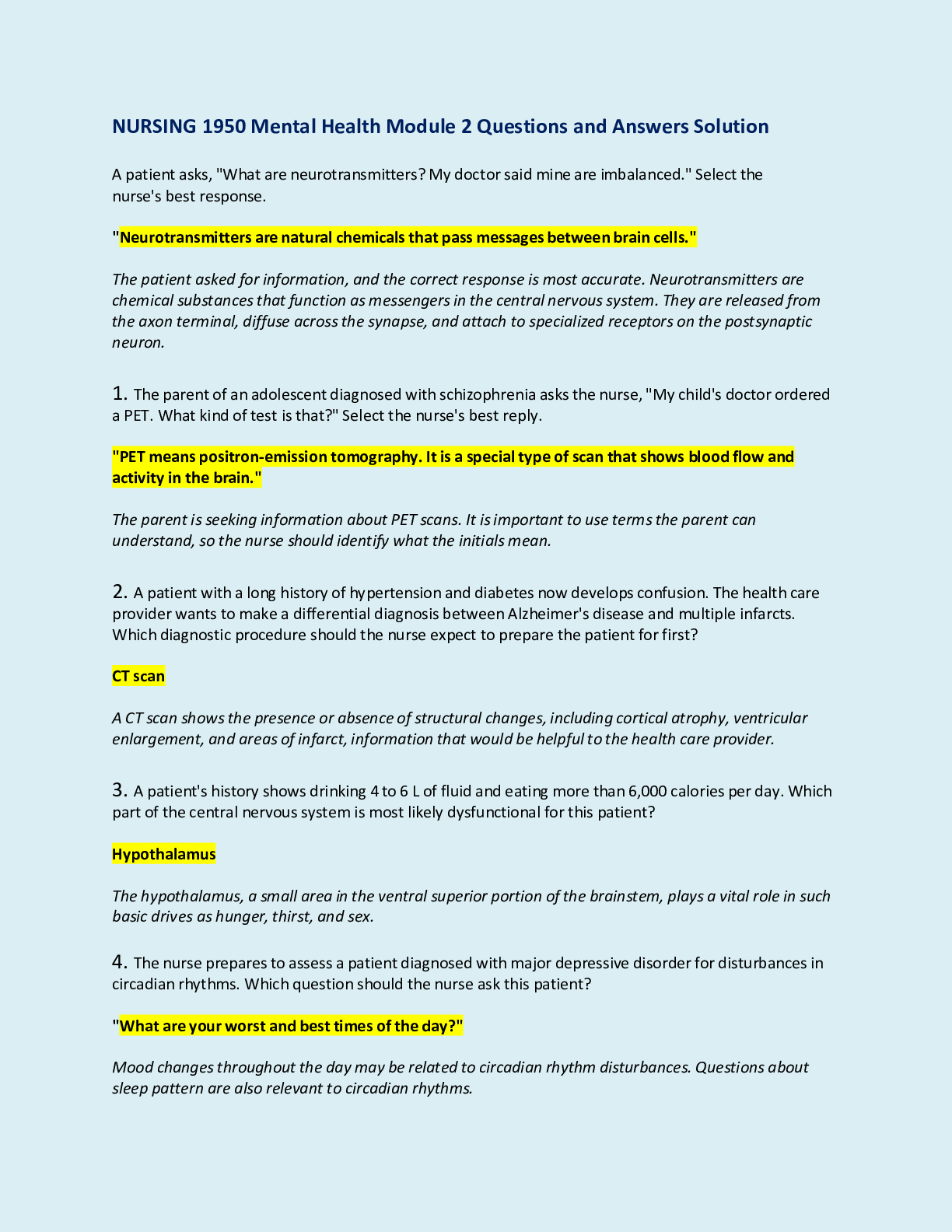
Buy this document to get the full access instantly
Instant Download Access after purchase
Buy NowInstant download
We Accept:

Also available in bundle (1)
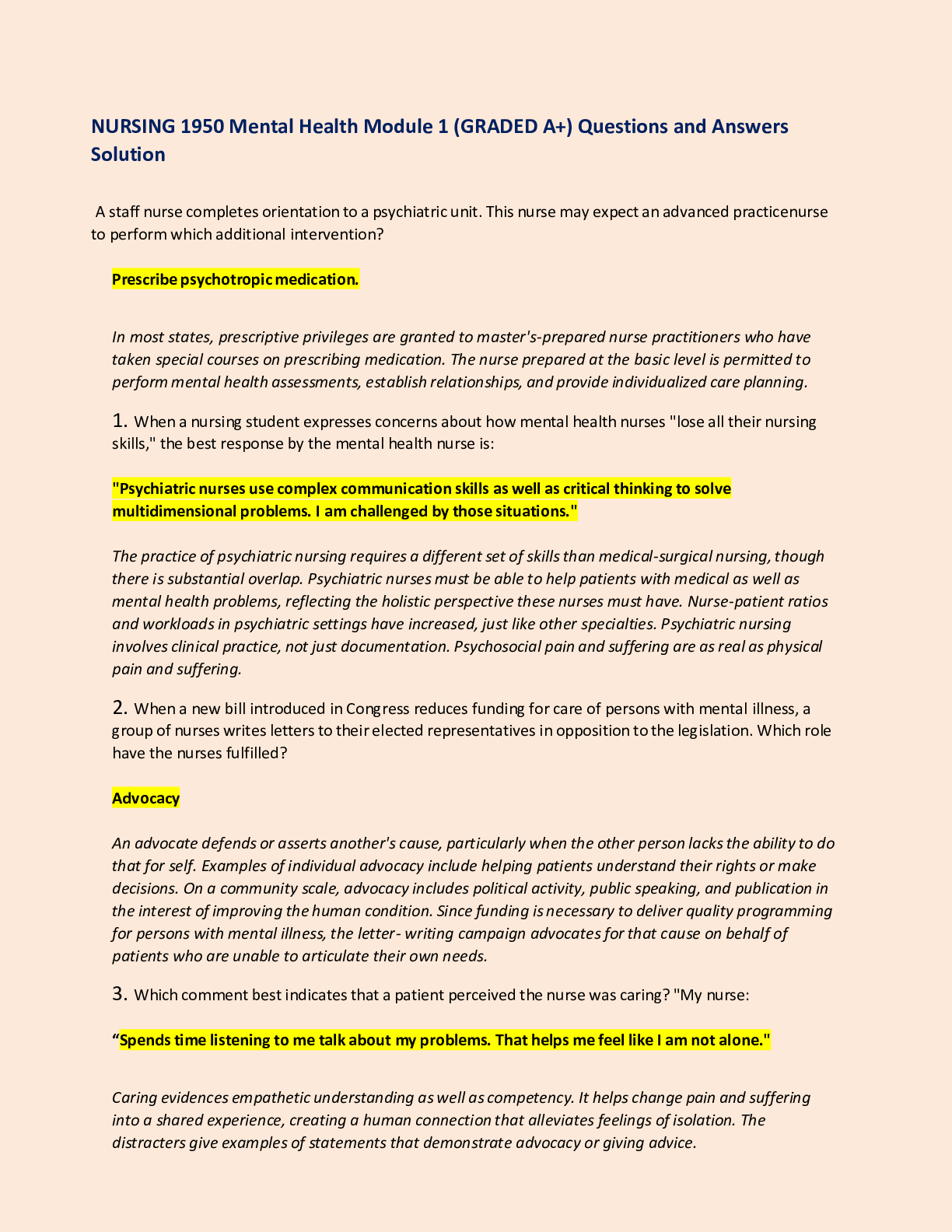
Nursing 1950 Mental Health Module BUNDLE Exams 1-6 with Questions and Answers- SRTC
Nursing 1950 Mental Health Module BUNDLE Exams 1-6 with Questions and Answers- SRTC
By Goodluck Academia 3 years ago
$14.5
6
Reviews( 0 )
$15.50
Can't find what you want? Try our AI powered Search
Document information
Connected school, study & course
About the document
Uploaded On
Jun 24, 2021
Number of pages
31
Written in
Additional information
This document has been written for:
Uploaded
Jun 24, 2021
Downloads
0
Views
89

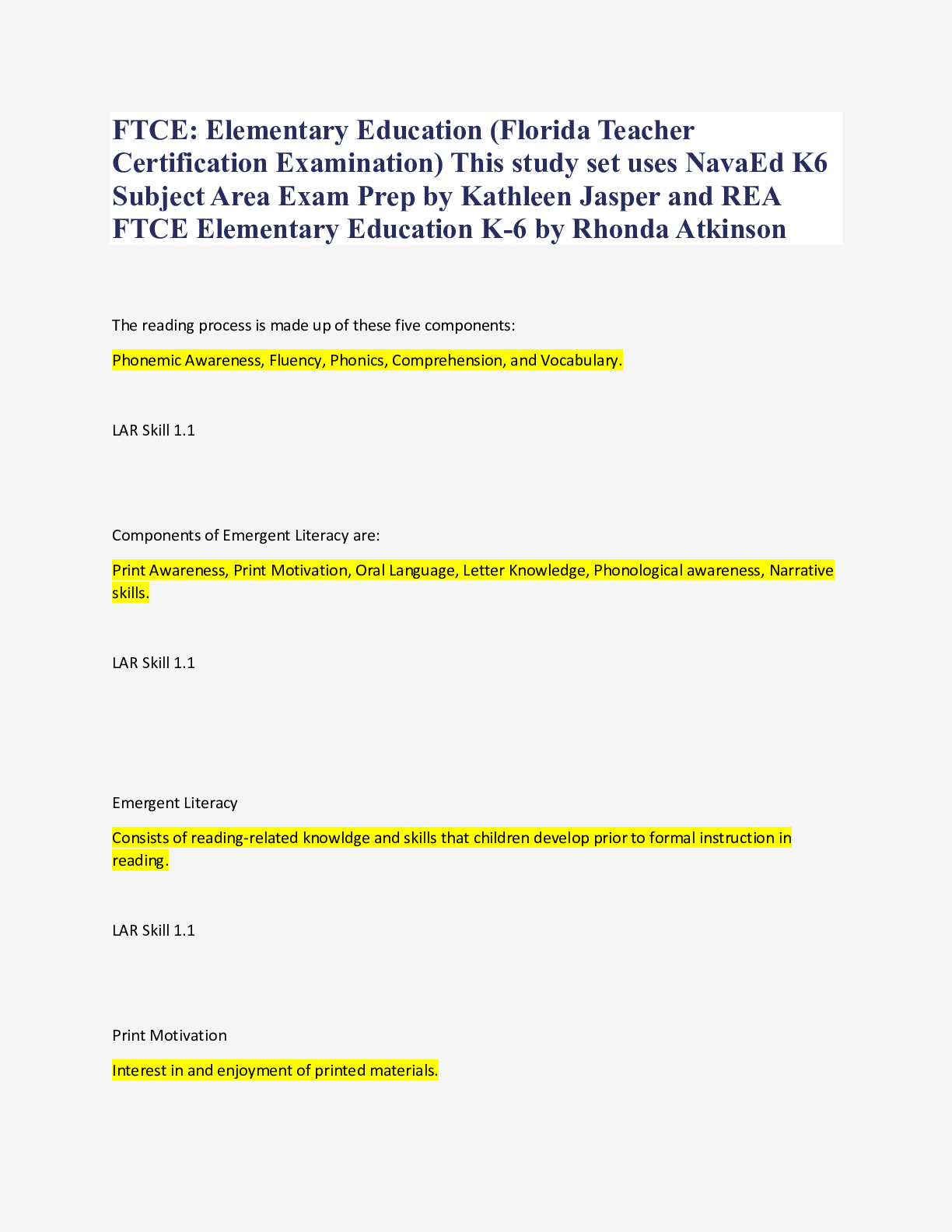

 Questions and Answers 100% VERIFIED.png)
 Questions and Answers 100% correct Solutions.png)



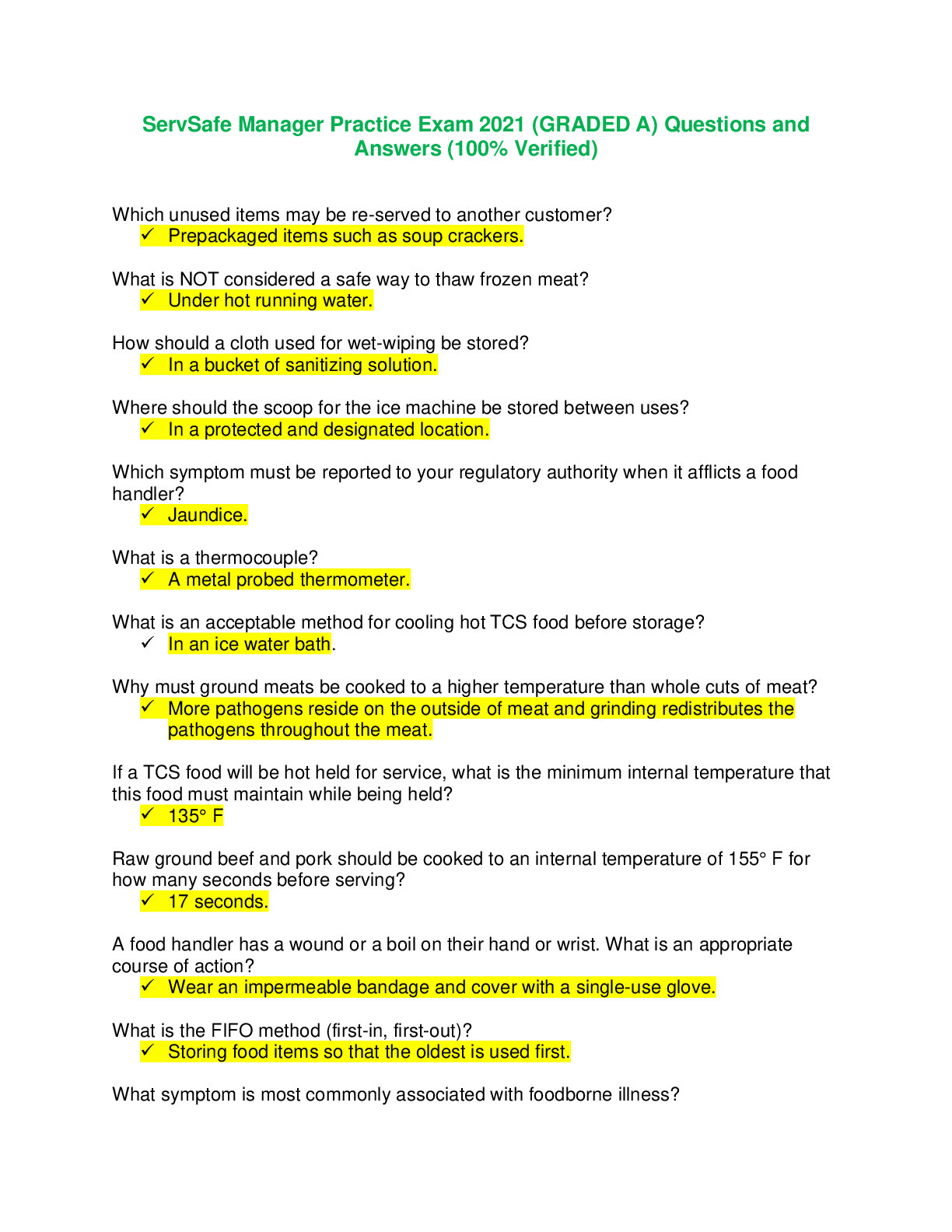


.png)


